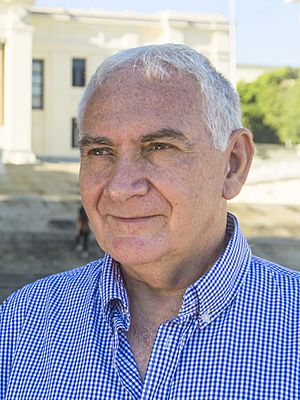Joseba Sarrionandia facts for kids
Quick facts for kids
Joseba Sarrionandia
|
|
|---|---|
 |
|
| Born | April 13, 1958 Iurreta, Basque Autonomous Community, Spain |
| Pen name | Sarri |
| Occupation |
|
| Language | Basque |
| Alma mater | University of Deusto |
| Notable awards |
|
Joseba Sarrionandia Uribelarrea was born in Iurreta, Biscay, Spain, on April 13, 1958. He is a famous Basque writer. He has written many books, including poetry, short stories, and novels. He has won several awards for his writing. Today, he is a very respected writer in the Basque Country.
In the early 1980s, he was involved with a Basque political group. In 1985, he left prison in an unusual way. After that, he lived secretly for many years while still writing and publishing books. In November 2016, it was shared that he was living in Cuba. There, he worked as a teacher at the University of Havana.
Contents
Joseba Sarrionandia's Life Story
Early Life and Education
Joseba Sarrionandia studied Basque Philology at the University of Deusto in Bilbao. After finishing his studies, he became a Basque language teacher. He taught about how sounds are made in language (phonetics) at different universities. He also wrote for several magazines like Zeruko Argia and Jakin.
Starting a Writing Group
Joseba Sarrionandia helped start a writing group called Pott Banda. He worked with other well-known writers like Bernardo Atxaga. He also created his own magazine called Ibaizabal. He enjoyed writing short stories and translating books. One famous book he translated was The Rime of the Ancient Mariner by Samuel Taylor Coleridge.
Life in Secret
In 1980, Joseba Sarrionandia was arrested. He spent time in prison. His experiences in prison later appeared in his writings. On July 7, 1985, during a concert at the prison, he found a way to leave. Another person, Iñaki Pikabea, left with him. They hid inside a large speaker. A Basque rock band called Kortatu even wrote a song called Sarri, Sarri to celebrate this event.
After leaving prison, Joseba Sarrionandia lived secretly for many years. The idea of living far from home became a very important topic in his books. For example, in his novel Lagun Izoztua (which means The Frozen Friend in Basque), he writes about being away from his homeland. Many of his poems have been turned into songs by Basque singers like Mikel Laboa and Fermin Muguruza. There is also an audio book where you can hear him read his poems.
Awards and Legal Status
On October 3, 2011, Joseba Sarrionandia won the Euskadi Prize for Essay in Basque. He won it for his book Moroak gara behelaino artean? (which means Are we ... in the fog?). This book talks about the problems of colonialism. The Basque Government held back the prize money for a while. This was because they needed to confirm his legal status.
However, after a month and a half, the Spanish High Court confirmed that Joseba Sarrionandia was no longer wanted by the law. This was because more than 20 years had passed since his prison sentence and escape. Also, his actions did not involve any victims. After this, the prize money was given to his family.
Life in Cuba
According to some reports, Joseba Sarrionandia lived in Cuba for many years. In 2014, he was invited to give two talks at Mondragon University in Spain. This would have been his first public appearance since 1985. However, he could not make the trip because he did not get the travel permissions he needed. Even though the Cuban government did not officially say he was there, a Spanish newspaper reported in 2015 that he visited the Spanish consulate to sort out his legal papers.
How His Writing Changed
Another famous writer, Bernardo Atxaga, has described how Joseba Sarrionandia's writing changed over time.
- At first, when he was young, he wanted to be part of Basque literature.
- Then, when he was in prison, his poems often talked about suffering.
- After he left prison, his writings focused on being away from home and his homeland.
- Today, his writing is calmer and often includes humor and irony. Atxaga even thinks there might be a fifth phase coming, where his writing might talk about new life, like a child.
Joseba Sarrionandia's Books
Here are some of the books Joseba Sarrionandia has written:
- Izuen gordelekuetan barrena (1981)
- Narrazioak (1983)
- Intxaur azal baten barruan. Eguberri amarauna (1983)
- Alkohola poemak (1984)
- Ni ez naiz hemengoa (1985)
- Atabala eta euria (1986)
- Marinel zaharrak (1987)
- Marginalia (1988)
- Ez gara gure baitakoak (1989)
- Izeba Mariasunen ipuinak (1989)
- Ainhoari gutunak (1990)
- Ifar aldeko orduak (1990)
- Gartzelako poemak (1992)
- Han izanik hona naiz (1992)
- Hnuy illa nyha majah yahoo (1995)
- Miopeak, bizikletak eta beste langabetu batzuk (1995)
- Hitzen ondoeza (1997)
- Hau da nire ondasun guzia (1999) (This book is available in Basque, English, German, French, and Spanish.)
- Zitroi ur komikiak: Joseba Sarrionandia komikitan (2000)
- Lagun izoztua (2001)
- XX. mendeko poesia kaierak: Joseba Sarrionandia (2002)
- Kolosala izango da (2003)
- Akordatzen (2004)
- Harrapatutako txorien hegalak (2005)
- Munduko zazpi herrialdetako ipuinak (2008)
- Gau ilunekoak (2008)
- Idazlea zeu zara, irakurtzen duzulako (2010)
- Moroak gara behelaino artean? (2010)
- Narrazio guztiak (1979–1990) (2011)
- Durangoko Azoka 1965-2015 (2015)
- Lapur banden etika ala politika (2015)
- Hilda dago poesia? ¿La poesía está muerta? (2016)
Awards Joseba Sarrionandia Has Won
- Ignacio Aldekoa Prize (1980)
- Resurreccion Maria Azkue Prize (1980)
- Bilbao City Council Prize (1980)
- Spanish Literature Critics' Basque Narrative Prize (1986) for Atabala eta euria (The Drum and the Rain)
- Spanish Literature Critics' Basque Narrative Prize (2001) for Lagun izoztua (The Frozen Friend)
- Euskadi Prize for Essay in Basque (2011)
See also
 In Spanish: Joseba Sarrionandia para niños
In Spanish: Joseba Sarrionandia para niños

